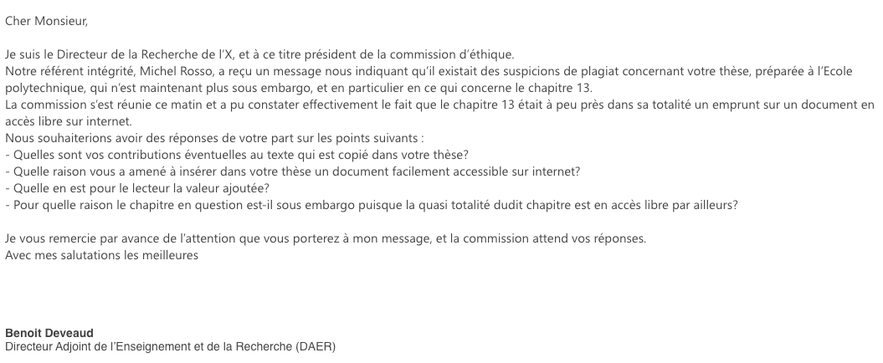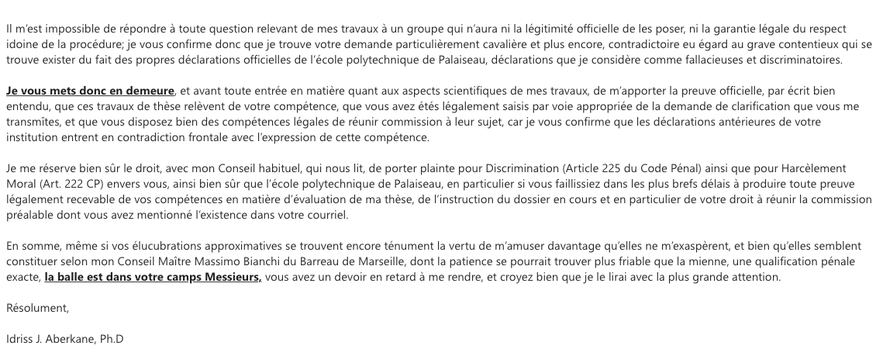He portrays himself as a mathematical prodigy, specialist in neuroscience, biology, geopolitics, computer science, philosophy, personal development and, more recently, in photography, for which he offers “masterclasses” at 60 euros. But Idriss Aberkane presents himself primarily as “the Hyperdoctor” who obtained “three doctorates” at 29 and who signs “Ph. D, Ph. D & Ph. D”. A sledgehammer argument that he brandishes in the face of his critics. In fact, his first doctorate in diplomacy and “noopolitics” [NDLR : un terme qu’il a inventé] was issued by the Center for Diplomatic and Strategic Studies in Paris in 2013, whose diplomas are not recognized by the French State. His thesis in comparative literature, carried out at the University of Strasbourg in 2014 is valid. But that in management science and applied epistemology, obtained at the University of Paris-Saclay and prepared at the Ecole polytechnique, is hanging by a thread.
The latter was obtained in 2016. As soon as it was validated, Idriss Aberkane requested that a five-year embargo be applied in order to protect “lines of code” present in the document. In 2021, the thesis is finally available for consultation. Curious people read it and discover the famous lines in chapter XIII, 47 pages long. Surprise, no industrial secret, but an almost complete copy-paste software documentation broadcast free of charge on the Internet in 2015, as L’Express revealed in 2022. Alerted, the University of Paris-Saclay and the Ecole Polytechnique instructed the Polytechnique Ethics Committee to conduct the investigation. After more than two years of deliberations, punctuated by dozens of insulting emails and countless threats of lawsuits, Benoît Deveaud, at the time director of research and president of the ethics committee of Polytechnique, recently retired, accepts to reveal the results of the investigations. Idriss Aberkane has always denied any form of plagiarism and accuses Mr. Deveaud of lies. Interview.
L’Express: What is the verdict of the investigation for suspicion of plagiarism of Idriss Aberkane’s thesis?
Benoit Deveaud: We delivered our verdict, unanimously, on September 2, 2022. We first found the obvious, namely that Idriss Aberkane plagiarized almost all of the 47 pages of chapter XIII of his thesis. We also took note of the fact that Idriss Aberkane had not had the slightest intention of discussing with us or admitting his wrongs. We have therefore decided, unanimously, to propose the cancellation of his thesis. This decision was forwarded to both the Ecole Polytechnique and the University of Paris-Saclay. To date, the application of the sanction is still pending.
Content of the report email received by the University of Paris-Saclay and the Ecole polytechnique. Above, chapter 13 of Idriss Aberkane’s thesis. At the bottom, the CEF 15 documentation. The blue parts are identical. The parts in green are original. The part in red corresponds to another copy-pasted from the Shiva 3D software documentation.
© / The Express
Before coming back to this last point, can you explain the process that led to your decision?
We are contacted in March 2021 by a whistleblower who suspects plagiarism in Chapter XIII. I immediately convene the ethics committee and we peel the thesis. We note plagiarism, obvious, but we ask ourselves questions. Pierre-Jean Benghozi, doctor of organization sciences, whom I had appointed to the ethics commission years before this whole affair and who was the director of Idriss Aberkane’s thesis, does not understand that this former student, with whom he had discussions excellent relations, could indulge in such gross plagiarism, or even try to cover it up with an embargo. On June 20, 2021 at noon, I therefore sent a first authoritative but cordial email to Idriss Aberkane (read below). At that time, we thought it possible that he would admit his mistakes and apologize profusely, as any student in good faith would have done, and we were preparing to find an amicable solution.

Email sent to Idriss Aberkane by Benoît Deveaud, director of research at the Ecole polytechnique from 2017 to 2023, and former director of the commission responsible for investigating suspicions of plagiarism.
© / Coll. private
Withdrawing his thesis was therefore not the first solution considered?
Universities are not bodies for the punishment of doctoral students. If he had made amends, if he had apologized and had agreed to modify his thesis, to register an erratum mentioning the plagiarism and to place chapter XIII in the appendix, the commission would undoubtedly have been lenient. We are more a body of mediation than of sanction.
However, this has not been the case. For what ?
Idriss Aberkane replied less than two hours after our first email. To my surprise, he showed incredible aggression. He brandished administrative documents and affirmed that I was not competent to carry out the investigations, forgetting that I was the director of research at Polytechnique and that as such I was perfectly legitimate to ask ethical questions. to any researcher in the School’s laboratories. He still felt that our questions were “rough rantings”, all while copying his lawyer and threatening us with legal proceedings and concluding: “Gentlemen, you have an overdue assignment to give me”.

Response from Idriss Aberkane, less than two hours after receiving the questions from the Ecole Polytechnique.
© / Coll. private
Faced with this unacceptable response, Pierre-Jean Benghozi fell from above. Two things are obvious then. The first is to convene a commission responsible for pronouncing a sanction. The second is to prepare for legal threats and ensure that the case is unassailable. The Ecole polytechnique and the University of Paris-Saclay agree that we will take charge of the case. We meet to put the texts back into shape – at that time, Polytechnique lawyers were overloaded with otherwise important cases and it was only a year later that texts tied up and signed by Polytechnique management were produced.
The commission therefore meets on September 2, 2022 in an official and indisputable manner. Mr. Benghozi, who is a deeply honest person, announces that he is withdrawing from the deliberations in order to avoid any conflict of interest. The rest of the members look at the thesis and note the complete plagiarism of chapter XIII, but also that there is very little copying and pasting in the other parts of the thesis. This is why we would have reached an amicable solution without the slightest difficulty if we had been able to calmly enter into discussions with him.
But between June 2021 and September 2022, I exchanged around thirty emails with Idriss Aberkane. His answers were systematically aggressive and insulting against me and towards the president of the Ecole Polytechnique, whom he threatened to take to court. But above all, he never answered on the merits of the case, that is to say plagiarism. I presented these exchanges to the commission of inquiry. We unanimously decided to reject the amicable agreement and to propose the cancellation of his thesis and his doctorate.
Idriss Aberkane therefore shot himself in the foot by refusing to explain himself and answer the questions put to him?
All the exchanges were complicated. For example, he used his old email address from the Ecole polytechnique for a publication in which he claims to have solved the Syracuse conjecture, a mathematical problem on which the greatest brains on the planet stumble. [NDLR : ces travaux ne démontrent pas qu’il l’a résolue]. I had contacted him to remind him that he had no right to use an address of an institution of which he had not been a member for years, not to mention that researchers wishing to contact him would not be able to do so (which shows the importance he attaches to the fact that we can debate with him). His e-mail response read: “Your interest in this line of my article should not surprise me. It is indeed the only line of this publication that you are able to understand.”
The plagiarism was therefore officially noted and the decision to withdraw his thesis was taken. Why was the sanction not applied?
It should be remembered that Idriss Aberkane defended his thesis on February 3, 2016, just one month after the merger between the doctoral school of the Ecole polytechnique and that of the University of Paris-Saclay. He therefore prepared his thesis at Polytechnique, but obtained it at Paris-Saclay. At Polytechnique, the entire management – the President, the General and the Provost – was ready to apply the sanction. But in the case of a breach of scientific integrity, a procedure must be followed and a specific body must apply the sanction. But when Idriss Aberkane defends his thesis, the Ecole polytechnique has texts to pronounce sanctions against employees, professors, students in masters … but not those in doctorate. This body has since been set up. But such decisions are not retroactive. Polytechnique not having the capacity to render the judgment, it sent the file back to the University of Paris-Saclay which had such an organization in February 2016. But the management of Paris-Saclay has not yet ruled.
Why ?
Paris-Saclay lawyers believe that it is up to Polytechnique to apply the sanction because Idriss Aberkane only joined the University one month before his defense. However, Polytechnique does not have the legal means to apply the sanction. Since then, everyone has remained on their positions and nothing has happened.
Are they afraid of losing a possible lawsuit?
They seem to have given in to the intimidation strategy of Mr. Aberkane, who is insulting both in his emails and on social networks, where he jumps on any pretext to make believe that the procedure is not legitimate. Legal departments are probably worried about every possible argument being used and published on the Internet, which they abhor. They surely fear the lawsuit and feel that they have other more serious matters to deal with. It should also be noted that university legal teams have few resources and are not necessarily equipped for such trials. But I think this case is important and deserves to be dealt with.
Last May, Idriss Aberkane claimed that you had been “discreetly released from the research department of polytechnique“. Were you fired because of the investigation against him?
This post made me laugh a lot. Even more when a person answered him that I was 70 years old and that it was perhaps normal for me to retire (laughs). And indeed, I retired at the end of my mandate, scheduled for 6 years.
Also in the month of May, he claimed to have filed a complaint for “forgery in public writing (a crime punishable by the Court of Assizes)” and for “fraud in an organized gang”. He accused you of having “brutally lied by inventing a false plagiarism story”, all while not “ruling out the possibility” that you are “essentially weak-minded or manipulated“. What do you think ?
Once again, we have in no way considered Idriss Aberkane to be a priori guilty. It was his answers that showed us very clearly that there was a desire on his part to mislead the reader, and that is what the Ethics Commission decided to sanction. As for the rest, I don’t think such remarks deserve any response.
